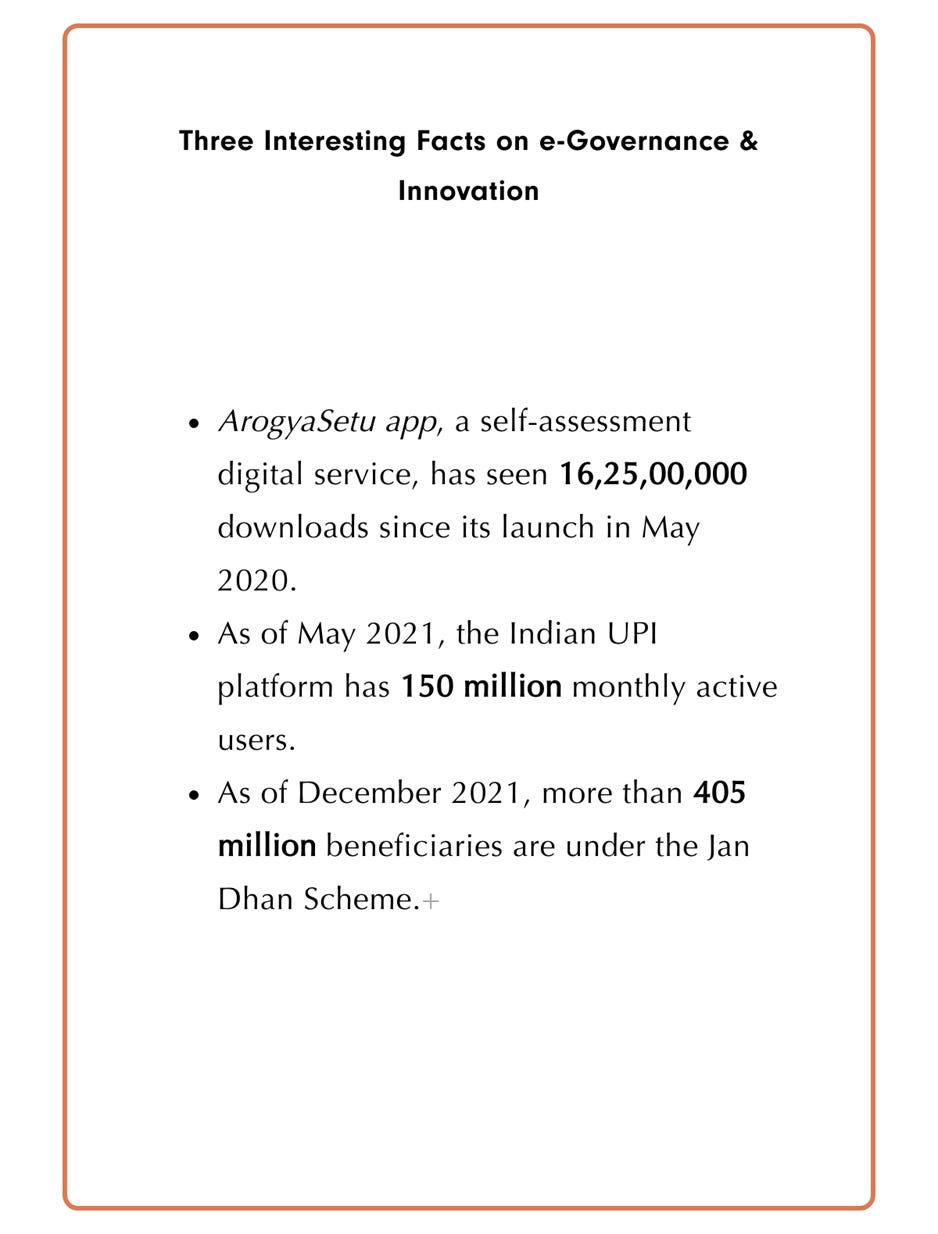Innovative Public Sector in India
Innovation in public service, and governance levels the playing field. There have been many interesting innovations in the last decade which have created a large scale change. This week we explore a few of them in a nutshell.
For every organisation, Innovation is essential to ascertain cost-effective & efficient solutions for complex problems. And, for a country like India, innovations are critical in delivering high-quality services in every sector because of the complexity of the issues.
In a study published in EPW, the state of Innovation in Indian Public administration was analysed. The results showcased most of the inventions are management innovations, followed by technological innovations. The Government of India's Mission E-governance, coupled with Digital India, has experienced a paradigm shift amid unpredictable business environments. There is new thinking on how it engrosses its citizens and inter-state & inter-governmental functions. Many examples were ascertained in healthcare services, agricultural productivity, clean water, sanitation & hygiene, FinTech, and waste management, such as:
Digital India is a government program aiming to “transform India into a digitally empowered society and knowledge economy.” During the pandemic, India employed the timely use of local government and community-based platforms such as “Ashas” in an attempt to mitigate COVID-19 at the grass-root levels. This included innovative governance mechanisms, which have provided multiple benefits ranging from crisis communication to ensuring entitlements and relief are provided to those who need it the most. Digital India schemes include Aadhaar (a tool for financial inclusion), Direct Benefit Transfer (DBT), eTAAL (organises e-Transactions statistics National & State level e-Governance), Paygov India, Public Financial Management System, and Single Window Interface for Trade (SWIFT).
Education- The government's National Policy on Education 2020 charts India on the course for an innovative, modern, and visionary learning system. Also, it is technology-based and inculcates a scientific temper.
Security- Mobile-based emergency services and disaster management are the critical areas of focus in eGovernance, which involves police modernisation and are protected by intellectual property rights. Also, the establishment of iDEX, which aims to achieve self-reliance and foster Innovation and technology development in Defence & Aerospace, is one of the significant innovations under homeland security.
Farmland- In 2016, the government launched a pan-India trading portal National Agriculture Market (eNAM), that links the existing Agricultural Produce Market Committee (APMC) mandis to create a unified national market for agricultural commodities. It helps farmers sell products without the interference of any broker or mediators. Direct Benefit Transfer (DBT) Central Agri Portal is another scheme launched in 2013. It is a unified central portal for agricultural schemes across the country. It helps farmers adopt modern farm machinery through government subsidies. Moreover, some significant innovations that farms commonly utilise include harvest automation, autonomous tractors, seeding & weeding, and drones.
Healthcare Services- Innovations include services providing information on different health areas; online registration for patients and clinics; patient tracking and monitoring; disease surveillance and patient messaging such as National Health Portal, Swasth Bharat, Vaccine Tracker, TB missed called initiative, etc.
Water Sanitation and Hygiene- Several IT-based innovations in the Sustainability of Water Resources cover pest/disease management, groundwater level improvement, urban flood management, and water quality monitoring via wireless sensor network systems. NextDrop enables data gathering for water distribution networks to identify problems in urban areas. SWATCH BHARAT app is another initiative to clean up India.
FinTech- Jan Dhan Yojana, a scheme launched by the Government of India that focuses on improving access to financial services for those without a bank account. The account holders also get insurance and loan benefits.
Waste Management- The Swatch Bharat Mission (SBM), which was set up under the Prime Minister of India, is an initiative that was launched with two components, namely, SBM (Gramin) & SBM (Urban) that addresses door-to-door garbage collection and proper disposal of municipal solid waste in all the 83,000 wards in urban areas by 2019.
e-Governance in India has progressively evolved from the computerization of government departments to initiatives that encapsulate the finer points of Governance. India has put its delivery of healthcare, education, agricultural support, financial services, and other economic and social obligations. These innovations build a robust, efficient, and effective e-Governance atmosphere that permits all stakeholders, primarily citizens. It is a leap crucial to the nation's emergence as global production and economic powerhouse. An organisation which has been described as the government's own startup is Invest India, and very briefly we describe what it does in the box below.
About INVEST INDIA
· Invest India was optioned in 2010 under Section 25 (limited company) of the Companies Act 1956 for promotion of foreign investment in India, it has DIPP as the largest stakeholder, followed by the state governments, and bodies such as CII, FICCI, and NASSCOM.
· It is the execution arm of Startup India and an award winning Investment Promotion Agency.
· Focus areas of Invest India: Proactive investor targeting, Bilateral CEO forums, Country-sector outreach, Strategic investment research unit, Harnessing ICTs for FDI, State investment promotion agencies, Startups, Accelerates growth of India's Innovations (AGNIi) and India Investment Grid.
· FDI inflows have experienced an unprecedented growth because of the efforts of Invest India and measures taken by the Government in FDI policy liberalization. India has recorded USD 64.38 billion FDI inflow in the year 2018-19 (78% increase over 2013-14).
Invest India, the national investment promotion and facilitation agency has been awarded the 2020 United Nations Investment Promotion Award out of 180 global investment promotion agencies by UNCTAD. It has also functioned like a startup to bring investments to the country since 2016. It can set up a business immunity platform within just 22 hours to handhold businesses on a 24*7 basis. The agency also has a resolution rate of addressing queries over 90%. Despite the Covid-19 pandemic, several unicorns emerged from India in 2020, or investments in the country, and the center of the action point was Invest India.




